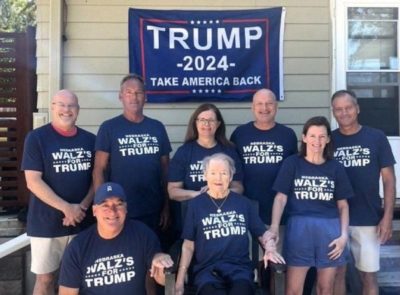The political discord within the Walz family has been making headlines as Donald Trump and his allies attempt to use it to their advantage. The spotlight is on Minnesota Governor and Democratic Vice-Presidential nominee Tim Walz, whose brother, Jeff Walz, publicly opposed his candidacy. Jeff expressed his disdain for his brother’s ideology, declaring he was “100% opposed” and doubting Tim’s suitability for leadership. Adding fuel to the fire, a photograph surfaced of individuals purportedly connected to the Walz family wearing “Nebraska Walz’s for Trump” T-shirts.
However, Donald Trump’s claims about the Walz family endorsement were quickly debunked. Jeff Walz, while critical of his brother, clarified on NewsNation that he hadn’t endorsed Donald Trump, nor did the entire family. It was later revealed that the Nebraska relatives in the photo were distant cousins, not immediate family members. This manufactured controversy underscores how Donald Trump’s camp is eager to capitalize on family divisions, but the drama surrounding Tim Walz pales in comparison to the deeper rifts seen in Trump’s own family.
The Trump Family’s Public Criticism
While Trump sought to amplify minor discord within the Walz family, his own relatives have been much more vocal and critical. The most prominent example is Mary Trump, Donald Trump’s niece, who has made several damning statements about the former president. In her 2020 book, Too Much and Never Enough, Mary described Trump as exhibiting “sociopathic tendencies” and called him unfit for leadership. She has consistently warned that his presidency was dangerous for the country and even urged him to resign.
More recently, Fred Trump III, another family member, shared a shocking account of Donald Trump’s alleged disregard for his own disabled nephew. According to Fred, Trump suggested that his nephew, who suffers from a severe disability, should be left to die rather than continue incurring medical expenses. These deeply personal accusations paint a much grimmer picture of family dysfunction within Trump’s orbit, far exceeding the relatively mild opposition seen in the Walz case.
Kennedy Family’s Strained Relationship with RFK Jr.
Robert F. Kennedy Jr., another 2024 political figure embroiled in family conflict, has faced widespread condemnation from his relatives. Despite his famous Democratic lineage, Kennedy’s independent presidential campaign, and more recently, his endorsement of Donald Trump, has caused major rifts within his family. His siblings have publicly denounced him, criticizing his stance on COVID-19 and vaccines, which they describe as “deplorable and untruthful.” Kennedy’s independent run, marred by conspiracy theories and misinformation, has further isolated him from his family, many of whom have pledged their support for the Democratic ticket.
This level of family opposition within the Kennedy clan is nearly unparalleled in American political history. While familial disagreements are not uncommon, the sharp and public nature of the rebuke Kennedy has received is notable. Like Trump, Kennedy’s family disputes serve as a reminder of how political ideology can fracture even the most well-known American dynasties.
Historical Context of Familial Political Disputes
Though family members publicly opposing political candidates is not new, the intensity and frequency of such conflicts have escalated in recent years. In 2018, six siblings of Rep. Paul Gosar (R-Ariz.) appeared in an ad opposing his re-election bid, citing moral and ideological differences. Similar incidents occurred during that election cycle, with candidates facing public opposition from close relatives.
However, the level of criticism Trump and Kennedy have faced from their families sets them apart. While there have been cases of family members subtly distancing themselves from a candidate, the direct and often harsh criticism from Trump’s and Kennedy’s relatives is a modern phenomenon that reflects the polarized nature of American politics today. Both men have become symbols of political extremism, with even their own kin turning against them, emphasizing the widening divides within American society.














